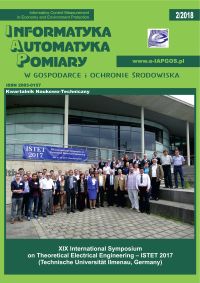MULTISENSORS FOR WHOLE-CELL ANALYTICS
Article Sidebar
Issue Vol. 8 No. 2 (2018)
-
TRANSIENT MODELING OF AC MACHINES CONSIDERING SECOND ORDER EFFECTS
Olga Korolova, Juan de la Torre Cubillo, Bernd Ponick4-8
-
ANALYSIS OF AN ANTI-PARALLEL MEMRISTOR CIRCUIT
Valeri Mladenov, Stoyan Kirilov9-14
-
ADVANCED MEMRISTOR MODEL WITH A MODIFIED BIOLEK WINDOW AND A VOLTAGE-DEPENDENT VARIABLE EXPONENT
Valeri Mladenov, Stoyan Kirilov15-20
-
MATHEMATICAL MODELING AND CONTROL SYSTEM OF NEARLY ZERO ENERGY BUILDING
Ildar A. Sultanguzin, Hannes Toepfer, Ivan D. Kalyakin, Alexandr V. Govorin, Ekaterina V. Zhigulina, Sergey Yu. Kurzanov, Yury V. Yavorovsky21-24
-
HARMONIC DOMAIN MODEL OF AN OPEN-LOOP CONTROLLED PWM CONVERTER
Malte John, Axel Mertens25-29
-
MAGNETIC FIELD OF COAXIAL SQUARE COILS ENCLOSED WITH HIGH-PERMEABILITY MATERIAL
Anamarija Juhas, Neda Pekaric Nad, Hannes H. Toepfer30-34
-
A DISTRIBUTED METHOD FOR TRANSIENT SIMULATIONS THAT DYNAMICALLY CONSIDERS SUPPLEMENTARY RESULTS FROM AUTONOMOUS SOFTWARE AGENTS
Matthias Jüttner, Sebastian Grabmaier, Jonas Rohloff, Desirée Vögeli, Wolfgang M. Rucker, Peter Göhner, Michael Weyrich35-38
-
MULTISENSORS FOR WHOLE-CELL ANALYTICS
Ingo Tobehn-Steinhäuser, Margarita Günther, Stefan Görlandt, Steffen Herbst, Heike Wünscher, Thomas Ortlepp, Gerald Gerlach39-41
-
TOOLS FOR COMPARING THE RESULTS OF THE WORK OF SORTING ALGORITHMS
Larysa Gumeniuk, Vladimir Lotysh, Pavlo Gumeniuk42-45
-
MODIFIED, COMPLEMENTED TAXONOMY OF FAULTS IN FAULT-TOLERANT REAL-TIME SYSTEMS
Volodymyr Mosorov, Taras Panskyi, Sebastian Biedron46-49
-
THE APPLICATION OF REDUNDANCY IN LEACH PROTOCOL
Volodymyr Mosorov, Sebastian Biedron, Taras Panskyi50-53
-
ANALYSIS MEDICAL AND STEREOSCOPIC IMAGES BY E-MEDICUS SYSTEM
Tomasz Rymarczyk54-57
-
ANALYSIS OF THE EFFECTIVENESS OF SELECTED SEGMENTATION METHODS OF ANATOMICAL BRAIN STRUCTURES
Róża Dzierżak, Magdalena Michalska58-61
-
ANALYSIS OF METROLOGICAL PROPERTIES FIBER BRAGG GRATINGS WITH A CONSTANT AND VARIABLE PERIOD
Tomasz Zieliński, Piotr Kisała62-67
-
A COMPARISON STUDY OF THE FEATURES OF DC/DC SYSTEMS WITH SI IGBT AND SIC MOSFET TRANSISTORS
Karol Fatyga, Łukasz Kwaśny, Bartłomiej Stefańczak68-71
-
PROPOSAL FOR MANAGING ELECTRIC ENERGY QUALITY IN THE LV GRID USING ON-LOAD TAP CHANGER WITH A STATIC SYNCHRONOUS COMPENSATOR
Bartłomiej Mroczek, Karol Fatyga72-78
-
ASSESSMENT OF FUEL MOVEMENT IN COMBUSTION PROCESS BASED ON THE DIGITAL IMAGE
Łukasz Pater79-82
-
NONLINEAR ANALYSIS OF HIGH Q RADIO FREQUENCY ENERGY HARVESTING NETWORKS
Christian Merz, Gerald Kupris83-86
Archives
-
Vol. 10 No. 4
2020-12-20 16
-
Vol. 10 No. 3
2020-09-30 22
-
Vol. 10 No. 2
2020-06-30 16
-
Vol. 10 No. 1
2020-03-30 19
-
Vol. 9 No. 4
2019-12-16 20
-
Vol. 9 No. 3
2019-09-26 20
-
Vol. 9 No. 2
2019-06-21 16
-
Vol. 9 No. 1
2019-03-03 13
-
Vol. 8 No. 4
2018-12-16 16
-
Vol. 8 No. 3
2018-09-25 16
-
Vol. 8 No. 2
2018-05-30 18
-
Vol. 8 No. 1
2018-02-28 18
-
Vol. 7 No. 4
2017-12-21 23
-
Vol. 7 No. 3
2017-09-30 24
-
Vol. 7 No. 2
2017-06-30 27
-
Vol. 7 No. 1
2017-03-03 33
-
Vol. 6 No. 4
2016-12-22 16
-
Vol. 6 No. 3
2016-08-08 18
-
Vol. 6 No. 2
2016-05-10 16
-
Vol. 6 No. 1
2016-02-04 16
Main Article Content
DOI
Authors
mguenthe@mail.zih.tu-dresden.de
Abstract
Whole-cell biosensors, which can be used in the environmental protection and process measuring technology, in the biotechnology, food and pharmaceutical industry for the on-line control and monitoring of chemical and biochemical processes and for the fast detection of small amounts of solutes, are of great interest. These kind of biosensors comprise microorganisms like genetically modified yeast cells, which react on a specific stimulus, e.g. a residual amount of drugs in the measurement medium with a dependent fluorescence. The receptors of the cells detect specific signal molecules and stimulate the organism to produce a fluorescent protein. In this work, a combined impedimetric-optical read out was used, which can provide the reliable and long-term stable detection of a fluorescence signal accompanied by impedance measurements monitoring cell vitality and activity. A new challenge thereby is a special sensor design which enables the integration of excitation source, photodetector, interdigitated electrodes, and the fluidic system with an effective and long-term-stable packaging.
Keywords:
References
Bidoglio G., Contini S., Gawlik B.M., Locoro G., Loos R., Rimaviciute E.: EU-wide survey of polar organic persistent pollutants in European river waters. Environmental Pollution 157/2009, 561–568.
Falås P., Jewell K.S., Joss A., Ternes, T.A. Wick A: Transformation of diclofenac in hybrid biofilm–activated sludge processes. Water Research 105/2016, 559–567.
Günther M. et al.: Kombinierter optisch-impedimetrischer Ganzzellbiosensor, 13. Dresdner Sensor-Symposium, Dresden 2017, 120–125.
Lide D.R.: Handbook of chemistry and physics – 83rd edition. CRC Press LLC, 2002–2003.
Meißner M.: Arzneimittel in der Umwelt: Natur als Medikamentendeponie, Dtsch Arztebl 105(24)/2008, A-1324 / B-1143 / C-1118.
Pliquett U. et. al.: Schlussbericht. IGF-Vorhaben-Nummer 16925 BR/2; Grundlegende Untersuchungen zu Miniaturelektrodenarrays für die Impedanzspektroskopische zelluläre Biosensorik.
Schröder M. et al.: Hochintegrierte Ganzzellsensoren für die Umwelt- und Medizintechnik. 13. Dresdner Sensor-Symposium, Dresden 2017, 148–152.
Article Details
Abstract views: 596
License

This work is licensed under a Creative Commons Attribution-ShareAlike 4.0 International License.






